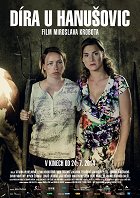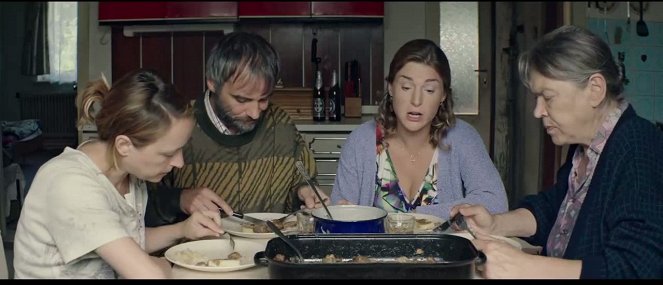Réalisation:
Miroslav KrobotPhotographie:
Jan Baset StřítežskýActeurs·trices:
Tatiana Dyková, Lenka Krobotová, Johanna Tesařová, Ivan Trojan, Jaroslav Plesl, Simona Babčáková, David Novotný, Hynek Čermák, Lukáš Latinák (plus)Résumés(1)
Maruna est gérante du pub de son village tchèque. Ex-enseignante, cette célibataire n'a pas encore trouvé chaussure à son pied. Dans Nulle part en Moravie, elle se découvre une nouvelle passion qui attise désormais tous les sens et les regards masculins, le tout teinté d'humour noir. (Prime Video)
Critiques (8)
(49th KVIFF) The relatively bizarre portray of Czech rednecks, with almost Twin Peaks dimensions even, and a funny joke here and there are a plus. However, like many other Czech films, Nowhere in Moravia is missing a clear theme or plot, something that is manifest, for instance, by the fact that almost any of the scenes of the last twenty minutes could have easily been the last, and nothing would be left unsaid (because, they actually never had anything to say). Most of the humour, as it’s the unpleasant habit in Czech movies, follows the template of famous actor speaking foully or behaving like an idiot = funny. Though, to be fair, the template here is enriched with the Moravian dialect. What an innovation.
()
An admirable performance in the discipline of "depicting a village stereotype," which simply cannot be titled anything other than another stereotype: "It’s good for Prague people," which is all the more disappointing because Krobot is a native of the region and in fact denies in such a fundamental way what he should understand best. The Prague actors spout dialect and vulgarisms through their teeth in a dysfunctional way and function only as wearers of great costumes. Yet it's an indescribably sad story, where the writer and producers seem to have realized at the last minute that the film would sell better as a redneck comedy. Fail.
()
A few interesting scenes and forcing yourself into deadpan poetics are not enough when the film relies on the classic pillars of Czech comedy: rednecks, pussies, vulgarisms, sweaty sex, and stars playing in "comic disguises". Add to that stupid stereotypes and the invention of a new form of dialect, which is the only thing that Krobot excels at. Nowhere in Moravia offers the misery of Czech cinema in full, but in a slightly more acceptable packaging.
()
Czech intellectuals who concentrate in cities usually go through two phases in relation to the countryside. The first represents idealization. They associate the intimately familiar urban environment with all imaginable flaws of modern civilization - consumerism, egoism, self-centeredness, promiscuity, and overall moral degradation. The countryside is supposed to be a place where the communal way of existence still functions, where people live modestly and in a harmonious relationship with nature, engage in publicly beneficial work, and preserve valuable cultural traditions of past generations. This idealization is even stronger when it can be supported by filtered childhood memories when they experienced wonderful adventures with relatives. Let's clarify what the countryside is not: satellite towns in the area around big cities with good transportation services, where those who cannot afford expensive urban housing move to. When intellectuals become acquainted with the reality of the countryside, the second phase sets in: profound disappointment. The intellectual is taken aback by the poverty of spirit (those who want something from life head elsewhere for education), the absence of the younger generation, the harshly pragmatic and even cynical relationship with nature, encountering envy and the desire for inaccessible consumption, which often takes on a sadly grotesque form. Cultural stimuli are missing, and instead of warm camaraderie, there prevails isolation and mistrust. Miroslav Krobot clearly went through the second phase during the filming, and the result reflects that. As a comedy, the film works if you are willing to reduce the comedic aspect to caricatures of rural boors. However, it does not work in terms of its dramaturgy, and Krobot did not showcase himself as a director with this film. The only strong aspect is the cast, which utilizes the strong lineup of the Dejvice Theater. I don't really understand the awards it received because it is a film that should not be included in the nomination at all, let alone reap its rewards. As a portrayal of life in a village, it is forced and exaggerated, and one is rather inclined to contemplate how the local economy and society function. Does a pub survive in a settlement with only a few dozen inhabitants? Overall impression: 40%.
()
A lot of people probably overlooked that the film is not called Vikantice u Hanušovic and that it is not a documentary about a village, but a film about people, or rather about human nature, about the faltering human destiny, about the effort to get from somewhere to somewhere, or from nowhere to nowhere. I believe this is one of the best Czech films in recent years. I can feel something of the Czechoslovak New Wave of the 1960s in it, it also takes place in a kind of non-specific timelessness, and it's a bit theatrical. It's more of an absurd metaphor than a normal story, which makes it more impressive. I thoroughly enjoyed not only the weird mood, but especially the top-notch performances by everyone, and I do mean everyone. I didn't expect the ratings to be so low and me to go so much against the tide.
()
L'absence d'intrigue cohérente, le rythme lent et la caméra essentiellement statique soulignent le minimalisme et la banalité du village morave et reflètent le style de vie calme et flâneur de ses habitants. Miroslav Krobot a réussi à mettre pleinement en œuvre sa vision claire, ce qui témoigne de ses capacités de création et de réalisation. Cependant, il ne s'agit pas d'une vision particulièrement divertissante, car la capture réussie de l'atmosphère des coins reculés de la région de Jeseník à travers plusieurs fragments du destin de villageois particuliers n'est pas suffisante pour un long métrage. Ne vous attendez pas non plus à une comédie hilarante. Il s'agit d'un regard réaliste sur le microcosme d'un petit village et en même temps d'une expression artistique de Miroslav Krobot, qui ne fait certainement pas honte à son premier film en tant que réalisateur. Cependant, il est difficile de dissimuler une certaine déception.
()
Les adeptes du théâtre de Dejvice ne seront pas déçus par l’équipe formée autour de Miroslav Krobot. J’ai eu des doutes pendant les quinze premières minutes, mais ensuite, ceux-ci se sont complètement dissipés et j’ai été plus que satisfait. L’humour est fortement basé sur les vulgarismes, mais c'est là toute la beauté de la langue tchèque, car lorsqu'ils sont utilisés à bon escient, ces mots sont aussi nobles que leurs homologues du langage écrit. D’après moi, deux acteurs ont tiré leur épingle du jeu : Simona Babčáková et Jaroslav Plesl. Seul Neužil manquait probablement au tableau.
()

